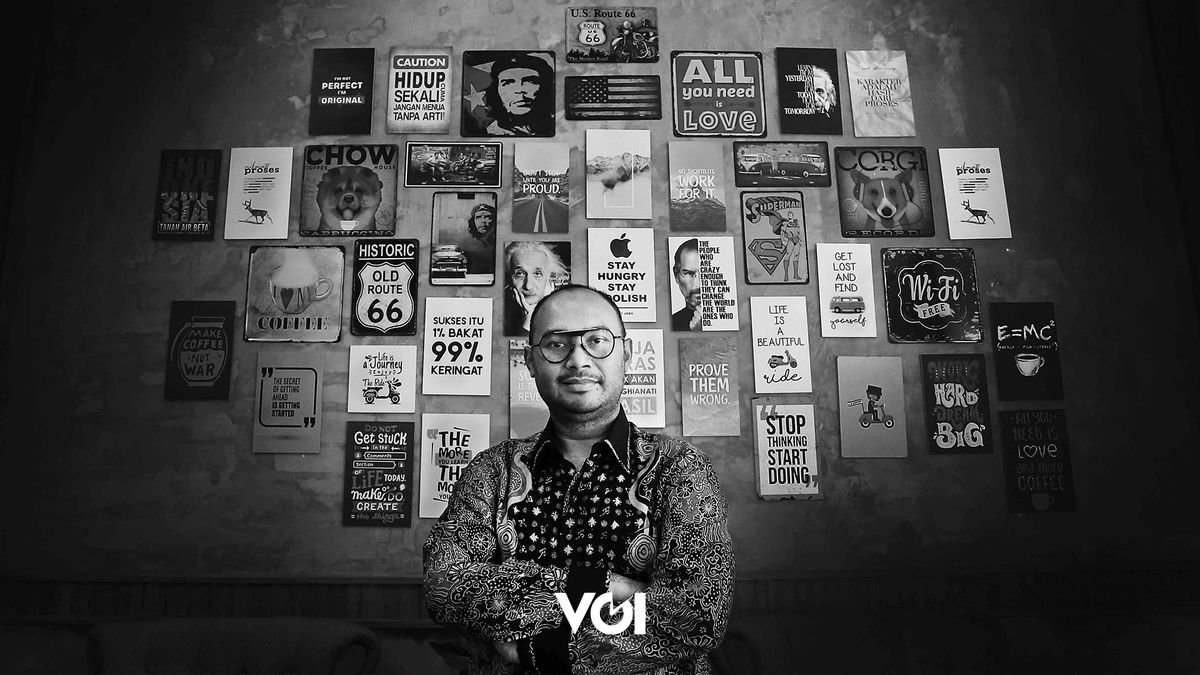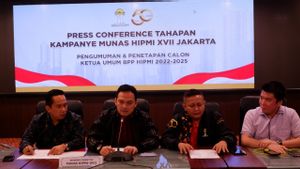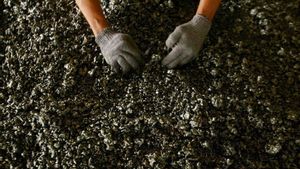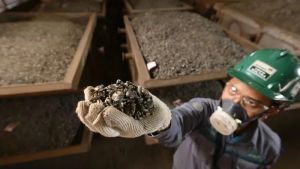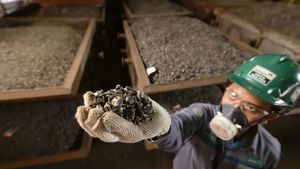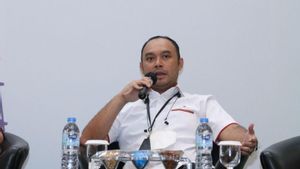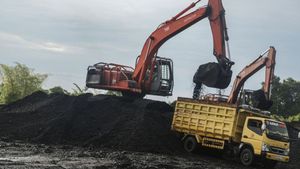President Jokowi's firm stance on banning the export of raw nickel or nickel ore has inflamed many countries that have been struggling in this field and then sued the WTO (World Trade Organization). Chairman Dr. Anggawira, MM, MH, Chairman of the Indonesian Energy and Coal Supplier Association (Aspebindo), supports this government's stance. There are many added values when nickel ore is not exported, among others, to protect national interests and maintain sustainability.
***
It is a country that is a member of the European Union that filed a lawsuit against the WTO regarding Indonesia's position in stopping nickel ore exports in November 2019. After going through the trial process in October 2022, Indonesia was declared defeated by the WTO. President Jokowi immediately ordered ESDM Minister Tasrif Arifin to appeal. Until now the process is still running.
What made the European Union countries protest loudly and file a lawsuit? It turned out that the cessation of nickel ore exports had an impact on the paralysis of the stainless steel industry in Europe due to a shortage of raw material supplies. Indonesia is the largest nickel-producing country in the world, in 2022, Indonesia's nickel production will reach 1.6 million tons, the second and third positions are occupied by the Philippines (330,000 tons) and Russia (220,000 tons).
However, Indonesia also has strong arguments regarding the termination of this raw nickel export. Namely protecting national interests and encouraging domestic industrial development. With this termination, there must be a downstream process in the country first, then the processed goods are exported to the destination country.
Downstreaming creates jobs and increases state revenues. According to the Director General of Minerals and Coal, Ridwan Djamaluddin, as reported by the ESDM website, nickel ore is processed into FeNi or concentrate, then processed into Ni-sulfate and Co-sulfate. Furthermore, it can be processed again to become a precursor which is the basic material for battery materials. "It is from this basic battery material that a lithium-ion battery is produced," he said.
However, said Anggawira, downstream building a smelter requires a lot of funds. "The existing smelters are still dominated by PMA (foreign investment), we hope that local investors can play a role. The government can help through regulation and banking with competitive interest loans," he told Iqbal Irsyad, Edy Suherli, Savic Rabos, and Irfan Medianto from VOI who met him at the Aspebindo office, at the Radio Dalam area, South Jakarta not long ago. Here is the excerpt.

Voices for the government to take a firm stand and act on the banning of nickel ore exports continue to echo, including from you from Aspebindo. What is your goal in voicing this?
We support the government's efforts in this regard, Mr. Jokowi who has been quite serious in the past few years in carrying out downstream programs in various sectors, including mining and minerals. The nickel export ban has implications for the country's revenue growth. Our hope is that the industry in this sector will continue to grow, even though the existing smelters are still dominated by foreigners in terms of ownership. This is a future challenge that must be faced.
Indeed, building a smelter requires a lot of money, and the role of the government and national banks can be increased. Our natural resources must be retained, not sold raw so they can have added value and have an impact on the people. We give appreciation to the government so that we can become a great nation and have prosperous people. The average income of Indonesia's population is middle, and we are one step away from becoming a developed country.
Indonesia is the world's largest nickel producer, what will happen to the companies that have already explored?
The types of nickel mines in Indonesia are different from those in Australia and China, which are mostly underground mines. In Indonesia, the mine is open, so production costs are lower. Through this nickel, we actually have the opportunity to rule the world, not just be governed by other people. This is the case with CPO, coffee, cocoa, etc., where we are the largest producer, but prices are regulated by others.
What is the current condition of nickel downstream?
Apart from being dominated by foreign investors, the downstream nickel sector is still in its early stages. Only about 20 percent of its potential has been realized. Still far from a usable product. If it can involve local entrepreneurs, then the money will not go outside. Currently, those who enjoy the tax holiday and tax allowance are still foreign investors. The hope is that the incentives provided are proportional to state revenues.
Why do foreigners still dominate smelters, what are the obstacles?
The main obstacle is financing. Banking must have special regulations. Interest rates in Indonesia are quite high, which makes us uncompetitive if the situation continues like this. Interest subsidies are not only for MSMEs, strategic industries can also be given. However, it must still be aimed at the right target, so that the big ones don't get bigger and the small ones get a chance.
Apart from funding, what are the other obstacles?
There must be a clear road map regarding this downstream. The industrial ecosystem must live. When investors are coming in, they see the whole thing, not just the raw materials. They also pay attention to distribution, logistics, human resources, stability, and legal certainty. All of these factors must be considered by the government so that investors are interested. They also consider the return on investment and return on investment. Competition to attract foreign investment in Southeast Asia is quite tight. Vietnam and Thailand are competing to provide incentives and ease of regulation to investors. What can Indonesia provide? That is the challenge. From previous investments, we must learn to transfer knowledge and technology from this investment process. When they are no longer here, we can do it ourselves.
In providing opportunities for investors to process nickel, there is an impression that the government is spoiling Chinese investors too much. What's your view on this?
Actually, the government provides equal opportunities for all foreign investors to enter and invest. However, the frequency of investors from China is indeed higher than investors from other countries in recent years. It gives the impression that the government is too indulgent to China, when in fact it is not. Compared to investors from Japan, Korea, and other countries, Chinese investors are more willing to take risks. What's more, they enter through state-owned enterprises of the Chinese government, not individual investors. Hence, their decision was quicker.
As the largest nickel producer, what strategies can be used to utilize this nickel?
We must have a strategy for utilizing nickel, don't just spend it. In contrast to coal which is used for energy, our nickel variations are many, so it is not only used for electric batteries. We must learn from America, even though they have a lot of oil reserves, they still carry out a saving policy. They optimize oil fields in other countries such as Saudi Arabia. In the long term, they still have oil reserves.
What is your view on illegal nickel exports which reached 5 million tons?
In this case, the government must carry out a thorough investigation, lest this just turns into a rumor. The export value of this size can be traced. Who is doing the export, through which port, destination to which city in China, and so on. This involves corporations, not individual exporters, given the size of the numbers. If proven, the government must provide strict punishment so that similar incidents do not happen again in the future. At this early stage, the government must immediately clarify whether there were any recording or administrative errors that occurred.

The banning of nickel ore exports, said Aspebindo Chairman Anggawira, requires downstreaming, but there are still obstacles, especially in funding. (Photo by Savic Rabos, DI Raga VOI)
For Aspebindo, we know him specifically in the coal sector. Does it now also cover nickel and other mineral entrepreneurs?
Initially, Aspebindo collected coal suppliers to PLN in the MSME class, while the large ones went to APBI (Indonesian Coal Mining Association). Two years ago, we expanded into other mineral sectors, including nickel, quartz sand, etc.
Is there a correlation between the case of illegal nickel exports to China and the government's ban?
After the government banned nickel exports, all parties carried out supervision, including the Bakamla (Marine Security Agency of the Republic of Indonesia). Exports are carried out by large ships, not barges. So, there is indeed a correlation between the export ban and the finding of alleged illegal nickel exports to China. The demand for nickel is very high. When there is a high demand, the incentive to meet the demand is also there. Who doesn't want to benefit? However, there are legal and illegal ways of doing it.
What is Indonesia's attitude towards the European Union's lawsuit to the WTO regarding the nickel export ban?
President Jokowi has emphasized several times that this is our right. Indonesia only bans the export of raw nickel. Prior to export, nickel must be processed through a downstream process. This is a trading strategy to create more added value for Indonesia. This is the momentum for us to make improvements. When the oil and gas boom, we also export crude oil, as a result, our oil processing industry is weak. We don't have a strong petrochemical industry. So, this is a momentum to invite foreign investors in and build a nickel processing industry in the country.
How is the country's readiness in this downstream process?
The government cannot run alone. The business world must also be involved. Today is the era of collaboration. The government only needs to determine the criteria for who can be involved, and the selection is made by the government. With collaboration, we can become stronger.
How to deal with issues of environmental damage and sustainability that are used by European countries to put pressure on Indonesia, as in the case of CPO and nickel?
Issues like these are often discussed. I think European countries should not use double standards. When they talk about deforestation, they are also talking about the industrial revolution centuries ago. When it comes to carbon trading, prices are higher in Europe than in Indonesia. It is not consistent. In the future, growth must go hand in hand with sustainability and environmental sustainability. We are already on the right track in this regard. We must be clever in this context so as not to depend on the will of foreign countries.
The IMF also suggested that Indonesia remove the ban on nickel exports, should we comply with this suggestion?
The IMF only gives advice, we have no attachment to them. We have settled our debt. Even with the WTO, we are still involved in cases. The government has appealed the WTO ruling which defeated Indonesia. Our diplomats must be good at explaining this to the world. We don't need to be too connected in this connected era. In my opinion, downstream is on the right track now. What matters is how we make it happen.
What is the view of entrepreneurs regarding the nickel export ban?
At first, we were happy, the exploration was immediately exported. However, now we have to follow government regulations, namely through the downstream process. This is an obligation that must be carried out so that the benefits are more felt by the people of Indonesia. In accordance with the mandate of the Constitution, existing natural resources must provide maximum benefit for the prosperity of the people. Through downstream, there is industrialization and job creation.
SEE ALSO:
The issue of environmental damage and sustainability in mining companies is often highlighted, what about this?
The assessment of mining companies is getting better, from red to green. Supervision is now very tight and can not be covered up anymore. If there is a violation, it must be dealt with firmly, in order to provide a deterrent effect. Environmental regulations are also very strict.
Mining companies are not only criticized for environmental damage and sustainability, but also for damage to road infrastructure such as in Jambi and South Sumatra. What is the solution to this?
Previously, the mining process in the Jambi area was not feasible due to the long hauling distances. However, with increasing coal prices, the situation became feasible. Meanwhile, road infrastructure is inadequate, so existing roads are damaged. In my opinion, going forward, if a region wants to develop the coal industry, the government must provide support, including in terms of building roads or other infrastructure for coal transportation.
Going forward, the use of coal will not be in line with the Paris Agreement which requires Net Zero Emissions by 2060. How will Aspebindo members respond to this?
Everyone, including entrepreneurs, must adapt in order to survive. The use of coal has been going on for a long time and needs to be adjusted. Technology continues to evolve and change over time. Currently, electric cars are being pushed even though they are still expensive. This is a challenge for coal entrepreneurs. There must be improvement and business diversification. Biomass and biofuels are also gaining popularity, as the world wants clean energy.
Is the coal explored by Aspebindo members used for domestic needs or for export?
In this case, we are required to allocate 30 percent of total production for domestic needs (DMO - Domestic Market Obligation), while the rest can be exported. Last year, the DMO target was not met and President Jokowi stopped it, this was due to the high price disparity. For now, the price disparity is not that big. I am optimistic that the DMO target can be achieved. Our DMO needs around 150 million tons of coal per year, while the total production reaches 600 million tons.
What about royalty regulations in the mining sector? Is the current royalty rate reasonable or does it need to be corrected?
For royalties, our hope is that they can be adjusted to fluctuate. When coal prices fall, royalties must also be adjusted. This is because production costs do not change. Therefore, it is necessary to have a mutually agreed upon scheme so that sustainability can be maintained.
Sometimes government regulations cannot be as fast as employers would like. What do you think about this?
We provide input, the existing regulations are at the level of ministerial regulations, so they should be adjusted. The government must see the existing reality.
The government is very serious about developing new renewable energy (EBT). How ready are Aspebindo members?
EBT is the future, it's time for us to optimize the use of renewable energy. Because fossil energy will run out. In addition, environmental sustainability must also be considered by using more EBT. However, the related rules must be clear. PLN, which has been the main player, must be more open. PLN is the sole player in the electricity sector, in accordance with the mandate of the law.
This is Anggawira's Way to Survive and Pass the Test

Since his father left him, Anggawira has to work together to raise his younger sibling with his mother. (Photo by Savic Rabos, DI Raga VOI)
Never satisfied and always looking for new challenges, is typical of the General Chairperson of the Indonesian Energy and Coal Suppliers Association (Aspebindo) Dr. Anggawira, MM, MH, in facing life's challenges and passing tests. Learning and continuing to learn is the key to success. Building a network also provides support for career success.
Angga, as he is usually called, was born into a modest family. "My late father was an ASN at the Ministry of Industry. We lived and grew up in the Mampang Prapatan area, South Jakarta. Our family life was like other ASNs, which was simple," said the man who was born in Indramayu, on January 9, 1982.
He lives in a Betawi village which still adheres to tradition. Angga really felt a thick childhood with religious overtones. "When I was small, I used to study the Koran after the Maghrib prayers at the mosque. Apart from going to formal school at SD, I also studied religion at the madrasa in the afternoon," said Angga, who really enjoyed his childhood.
Another nostalgia that will never leave Angga's mind is when his father invited him to the office several times, he accompanied his father to participate in ping pong tournaments and other activities. "Father's office and where we live are close, it's enough to walk," he said, remembering his childhood.
However, togetherness with his father did not last long. "At the age of 43, my father died. At that time, I was still in college. After that, life became difficult and I had to struggle with my mother to stay in college and raise my younger siblings," said Angga, the eldest of three siblings.
Hard Forging of Life

While studying at IPB, Anggawira was not only concerned with university affairs but was also active in campus internal and external organizations. (Photo by Savic Rabos, DI Raga VOI)
Even though it felt heavy, Anggawira was grateful for the situation. "In a situation of limitations, I am still grateful, able to survive, and forged with the rigors of life. Maybe if there was no such situation, I would not be where I am now. The limitations and suffering trained me to be strong and pass the test," he said.
While studying at the Bogor Agricultural Institute (IPB), Angga did not only focus on studying, he was active in organizations both inside and outside the campus. This organizational network is very helpful in pursuing a career as an entrepreneur. "During college, I was active in various organizations, but I didn't neglect my assignments on campus. The proof was that my GPA was quite good, and this helped me find a job. However, I felt uncomfortable with the work routine and finally decided to leave, " said Angga who is active in BEM, Student Press Institute, Islamic Student Association (HMI), and so on.
He had worked part-time and helped friends at a consulting agency before becoming an expert staff member at the FPDIP at the DPR RI. However, this experience only lasted for two years (2007-2009). Angga then tried entrepreneurship with friends. "My friends and I set up our own company. Initially, we worked on small projects such as procuring stationery in government offices. Gradually our company developed and is now more focused on the energy sector," explained the founder of CV Sejahtera Utama Mandiri, Angga's first business, then he established PT Permata Transindo.
Not Planning to Be an Entrepreneur
Angga admits that he never planned to become an entrepreneur. Everything happened naturally, and when the opportunity arose, he took it well and thus reached where he is today. "The spirit of entrepreneurship arose when I was still a student. My first business was selling sacrificial animals," recalls Angga who currently serves as Deputy Chair of the Research and Technology Council, Kadin 2021-2026.

Angga did not plan to become an entrepreneur, the opportunity and circumstances that made everything happen as it is today. (Photo by Savic Rabos, DI Raga VOI)
He never thought he would be involved in the energy business as he is today. At first, his goal was to become an accomplished politician. When he was still a student, his role models were Akbar Tanjung, Anas Urbaningrum, and other political figures.
However, the opportunity comes precisely in the business sector. "This is what I have been pursuing until now, being an entrepreneur and a professional," said Angga, who is also a lecturer at a private university in Jakarta.
For the younger generation, he gave a message not to be fixated on just one field, because opportunities are always there and they vary. Angga also shared experiences that helped him overcome various obstacles. "Keep learning and never stop looking for new things. Don't get complacent and get stuck in a comfort zone. There is no such thing as luck, there are only opportunities that meet readiness. So take advantage and optimize the opportunities that come, because not all opportunities will come twice times," emphasized the Secretary General of HIPMI 2022-2025.
One of the opportunities that Angga took advantage of was when Jokowi and Prabowo joined forces after facing tough competition in the presidential election. "At that time, I was the spokesperson for the Prabowo-Sandi Team. Even though I was on the losing side, it turned out that Prabowo was in President Jokowi's cabinet. I made the most of this opportunity," said Angga, who is currently a supervisor at SKK Migas, Team Expert Minister of Investment/Head of BKPM, and commissioner in several state-owned energy companies.
As a Muslim, Angga has the principle that benefiting others is the most important thing. "For me, being a human being who benefits other people and the environment is the most important thing. Don't be a burden, but try to provide benefits whenever possible," said Anggawira.
"There is no such thing as luck, there is only opportunity met with readiness. Therefore, take advantage and optimize the opportunities that come, because not all opportunities will come back,"
The English, Chinese, Japanese, Arabic, and French versions are automatically generated by the AI. So there may still be inaccuracies in translating, please always see Indonesian as our main language. (system supported by DigitalSiber.id)
